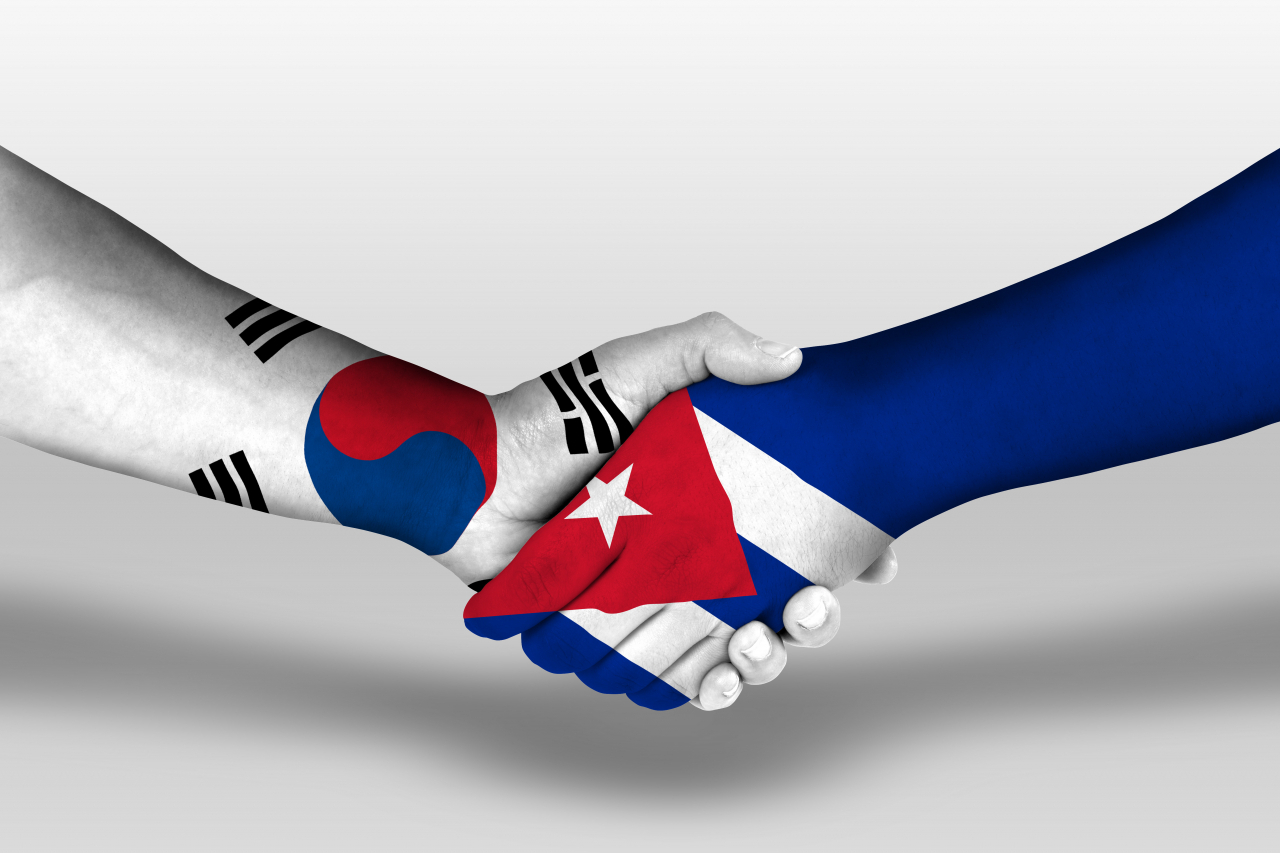Seoul side-eyes N. Korea while forging ties with Cuba
'Seoul-Havana ties exert significant political pressure on Pyongyang, shows who holds dominant force'
By Ji Da-gyumPublished : Feb. 15, 2024 - 15:36

The surprise establishment of diplomatic relations between South Korea and Cuba marks the culmination of Seoul's diplomatic endeavors with socialist countries that have historically maintained friendly ties with North Korea, according to the presidential office on Thursday.
South Korea and Cuba on Wednesday evening officially announced that they had forged diplomatic relations, fulfilling Seoul's decadeslong aspiration to engage with the socialist country. Seoul believes the move delivers a blow to North Korea.
"The establishment of diplomatic ties with Cuba signifies the culmination of our diplomatic engagements with socialist countries, including former Eastern Bloc countries that were friendly to North Korea," a senior presidential official told reporters on condition of anonymity.
"The establishment of diplomatic ties serves as a definitive illustration of the prevailing trend in history and clearly indicates who holds the upper hand."
The official said the "establishment of relations with Cuba was not a simple issue but rather a long-standing goal and challenge for Korea," acknowledging that Cuba's "extensive and enduring relationship" with North Korea posed the biggest obstacle.
The official explained North Korea and Cuba signed a treaty of friendship and cooperation on the occasion of then-Cuban leader Fidel Castro's visit to North Korea in 1986. In the preamble of the treaty, there was a passage stating that the two countries had a "fraternal solidarity relationship."
"Therefore, it is expected that North Korea will inevitably suffer significant political and psychological repercussions due to this establishment of diplomatic relations," the official said.
"The reason Cuba was unable to readily agree to establish diplomatic relations, despite holding positive feelings toward (South) Korea for various reasons such as the Korean Wave, was primarily due to its relationship with North Korea."
Negotiations between South Korea and Cuba had been conducted clandestinely, particularly considering Cuba's long-standing relations with North Korea.
North Korea and Cuba established diplomatic ties in 1960, just a year after Fidel Castro's revolution. Since then, the two countries have maintained close exchanges for decades, particularly during the Cold War era, primarily based on anti-American and socialist ideologies.
In stark contrast, Seoul and Havana ceased all exchanges and refrained from contacting each other on the international stage after Fidel Castro overthrew the Fulgencio Batista regime and led the socialist revolution in 1959.
Under Castro's rule, Cuba aligned itself with the Soviet Union, becoming a communist state and a focal point of Cold War tensions between the United States and the Soviet Union, including the Cuban Missile Crisis in 1962.
But in a surprising turn of events, representatives of South Korea and Cuba exchanged diplomatic notes on Wednesday in New York, officially establishing diplomatic and consular relations.
With Cuba becoming the 193rd country with which South Korea has established diplomatic relations, only Syria remains among UN member states with which South Korea has yet to forge diplomatic ties.
"The establishment of diplomatic relations with Cuba, the only non-diplomatic country in the Latin American and Caribbean region, marks a significant turning point in enhancing South Korea's diplomacy in the region," South Korea's Foreign Ministry said Wednesday in a statement.
"It is expected to contribute to expanding our diplomatic horizon as a global pivotal state."
The presidential office on Thursday underscored that Cuba has established diplomatic relations with around 190 countries and hosts embassies from more than 100 countries, making it a key country in Latin America.
The official emphasized that "Cuba has played a considerable significant role in the Non-Aligned Movement and 'third world' diplomacy."

One South Korean diplomatic source, speaking on condition of anonymity to The Korea Herald on Thursday, said that South Korea has been striving for around 20 years to establish diplomatic relations with Cuba.
The initiative began during the Kim Dae-jung administration in 2000, and the efforts were renewed under the Yoon Suk Yeol government.
Another diplomatic source said, "The Korean government has been making consistent efforts to improve relations with Cuba."
According to the source, high-level South Korean officials have consistently sought engagement at various events, including the UN General Assembly and those hosted by the Caribbean Community. During these gatherings, they actively "sought opportunities to meet with Cuban officials to explore avenues for enhancing bilateral relations."
For instance, then-Foreign Minister Park Jin met with Cuba's Deputy Foreign Minister Josefina Vidal on the sidelines of the council meeting of the Association of Caribbean States in Guatemala in May last year.
"Cuba has responded positively, leading to the establishment of diplomatic relations," the second source said.
In conversation with The Korea Herald, multiple diplomatic sources explained the clear imperative both for South Korea and Cuba to establish diplomatic ties, especially in light of increasing cultural, economic and people-to-people exchanges between the two countries.
Prior to the COVID-19 pandemic, around 14,000 South Korean nationals visited Cuba annually. Additionally, around 1,100 descendants of Korean immigrants who migrated there onward from Mexico in 1921 currently reside in Cuba.
Since the Korea Trade-Investment Promotion Agency opened a branch office in Havana in 2005, there has been steady progress in bilateral trade. In 2022, South Korea's exports to Cuba totaled $14 million and imports from Cuba amounted to $7 million.
In the statement, the Foreign Ministry on Wednesday said the establishment of diplomatic relations is expected to "contribute to the expansion of substantive cooperation between the two countries by creating institutional frameworks for enhancing economic cooperation and supporting Korean companies' entry into the Cuban market."
The Foreign Ministry highlighted expectations for streamlined consular assistance to be provided to South Korean nationals visiting Cuba.
The Korean government also credited newfound openness in Cuba to the favorable perception of Korea among Cubans, driven by their avid interest in K-pop and Korean drama series.
One Cuban group called Club de Arte Coreano includes roughly 10,000 fans of Korean popular culture. In film, the Cuban Cinema Festival was held in central Seoul in summer 2022, while a special exhibition featured Korean films at the Havana Film Festival in December last year.
The Foreign Ministry underscored that the "proliferation of positive perceptions among the citizens of both countries, facilitated by recent vibrant cultural exchanges, has contributed to establishing diplomatic relations."
The ministry said the Korean government will actively engage in discussions with the Cuban government on follow-up measures, including the mutual opening of missions in each country.



















